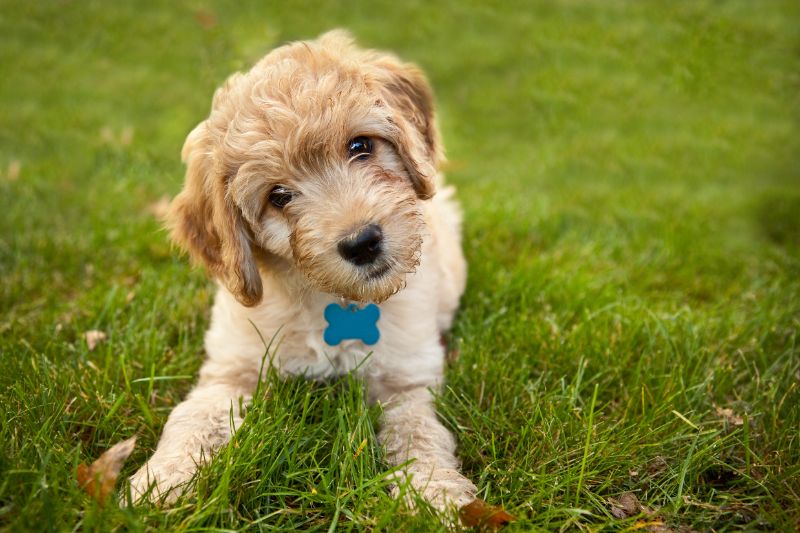
Puppy Behavior: A Weird and Wonderful World

Puppies may be among the cutest things on the face of the planet. Sometimes, it seems like that cuteness may be a bit of a survival mechanism, though. As adorable as they are, puppies can come with certain habits and qualities that are less than endearing.
Potty accidents on your new rug, chewing up shoes, whimpering for attention while you try to sleep; these are all trying, but common, experiences for new dog owners. Most difficult puppy behavior is temporary. Just as a human baby must learn about their world and grow comfortable in it, so must our puppy population.
Some puppy behavior is cause for concern, though. Arlington Animal Hospital wants to be sure that dog owners know what is normal for puppies and which puppy behavior needs to be addressed right away.
Puppy Behavior to Note
Puppies are new to life and still learning the ropes, as well as the rules of living in your home. It is very natural that they make mistakes and sometimes let their curiosity get the best of them. So which puppy behavior is worrisome and which is okay?
Take heed! Here is our countdown of 7 puppy behaviors to watch out for:
7. Hiding from people, other animals, or objects – This behavior is indicative of fear, which can easily progress to aggression as your pup matures. Establishing a happy, safe environment is key for your puppy’s development.
6. Aggressive body language – Raising hackles in response to people or animals, lunging, or barking as an alarm is not normal behavior in a puppy that has no negative history and requires early intervention.
5. Mouthing during handling – Puppies use their mouth to explore their world, but using their mouth on your body during handling such as paw handling, hugging, and removing objects from the mouth is not okay. Especially if combined with other aggressive body language like growling, raising a lip, or a stiff body posture, mouthing behavior is cause for concern for aggressive tendencies or pain.
4. Reluctance to sit or lie down – Especially if your pup knows these commands, hesitance to perform them could indicate pain. Orthopedic issues like hip dysplasia can certainly lead to reluctance to lie or sit on command.
3. Crate issues – A pup who vocalizes, urinates or defecates, or becomes destructive when crated or otherwise confined may be experiencing separation anxiety. This can worsen dramatically if not addressed.
2. Potty problems – All puppies have accidents, but puppies who urinate or defecate repeatedly in an appropriately sized crate when confined for a reasonable amount of time may have a medical issue, separation anxiety, or have unlearned instinctual hygiene habits out of necessity.
1. Aggression – Aggressive body language when you move the food bowl or a bite pick up your pup, aggression towards the cat or children in the home, or possessive behavior about toys, treats, people, or places is not okay. Pain, fear, or other issues can drive these behaviors, which may become more dangerous as your puppy grows.
What to Do if You Need Help
If any of this puppy behavior sounds familiar, you need to seek help. These are all issues that potentially can amplify over time, and early and effective interventions are necessary. Waiting for your pet to outgrow the behavior is seldom the right answer and often makes things much worse.
At the first sign of concerning puppy behavior, call us. The first step is for us to complete a thorough medical examination to ensure that pain or other issues are not playing a role.
Avoid the urge to punish your puppy. Physical or verbal reprimands, aversives like pinch collars or spray bottles, or crate confinement as a punishment tend to make things worse and amplify fear or aggression. Punishing a pet for growling or displaying aggressive body language often just teaches them not to warn before they bite.
If we are able to rule out a medical issue, we can counsel you on the behavioral management of these undesirable puppy behaviors. Many of these situations will require the assistance of a good trainer who is well versed in positive reinforcement training. Some may even need the help of a veterinary behaviorist.
The key when it comes to puppy behavior is to identify problem behavior as soon as possible and to take quick action. This, in concert with good, qualified help can result in a pet whom you and your family are able to enjoy for many years to come.
Contact Us!
2301 Columbia Pike #G-1, Arlington, VA 22204
Phone: (703) 920-5300
Fax: (703) 685-8860
Email: info@myarlingtonvet.com
Office Hours
-
Monday
8 a.m. – 8 p.m.
-
Tuesday
8 a.m. – 8 p.m.
-
Wednesday
8 a.m. – 6 p.m.
-
Thursday
8 a.m. – 6 p.m.
-
Friday
8 a.m. – 6 p.m.
-
Saturday
8 a.m. – 2 p.m.
-
Sunday
CLOSED
- Doctors’ hours are by appointment only.



